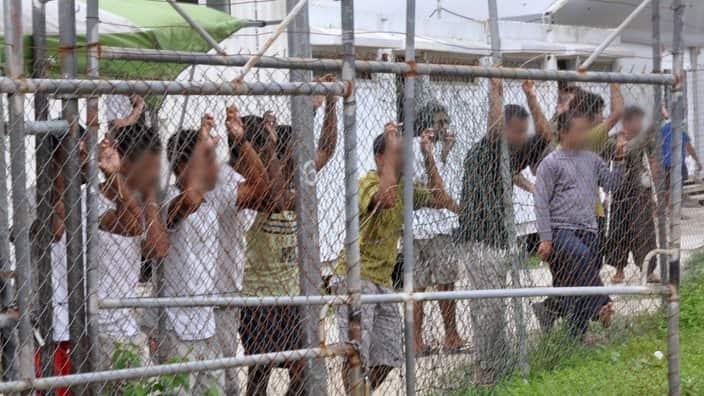With Australia’s offshore processing agreement with Papua New Guinea ending on 31 December, Sudanese asylum seeker Yasir Omar is riddled with anxiety about what his future holds.
“The situation is bad … people are confused. We don’t know what’s going to happen,” Mr Omar told SBS News.
“We just stay. We are hostages. Eight or nine years [in PNG] and nobody knows anything.”
Mr Omar spent six years detained on Manus Island before he was transferred to Port Moresby in 2019.
He travelled to Australia by boat in 2013 after fleeing Darfur in Western Sudan during a time of mass bloodshed and genocide.
The Darfur genocide against the ethnic Darfuri people began in 2003 after ethnic African rebels revolted against former President Omar al-Bashir's Arab-dominated government. People in the region are still subjected to ongoing violence, with more than 150,000 people having been displaced, according to data from the International Organization for Migration.
People in the region are still subjected to ongoing violence, with more than 150,000 people having been displaced, according to data from the International Organization for Migration.

A displaced Sudanese woman walks past a UNAMID vehicle at the Kalma camp for internally displaced people in Darfur's state capital Niyala on 9 October, 2019. Source: Getty
But for Mr Omar, who has been robbed four times since 2019, PNG also does not feel safe.
“They beat me and took my phone four times. In 2020, they attacked me in my house,” he said.
“You walk in the street, people start to talk about you. They start swearing at you… They see you’re different, you’re not from this place.”
Mr Omar said that the allowance asylum seekers are given each week - about $300 Kina (AUD$118.17) - is inadequate.
“This is not enough because some of the people get married and some of the people have a family … so they find it hard,” Mr Omar said.
He said the company responsible for the food does not give asylum seekers cash to go buy items themselves.
Instead, asylum seekers have to choose from the company's list of food items, which he claims is more expensive than food at the shops.
"This situation will get worse when the Australia-PNG deal ends," he said.
End of PNG deal but offshore processing in Nauru continues
Around 118 refugees and asylum seekers remain in Papua New Guinea as Australia's processing agreement with PNG ends.
The decision to end the agreement with PNG comes after the Australian-run detention centre on Manus Island was found to be illegal and ordered shut by the PNG supreme court in 2016. As a result, Australia was forced to pay $70 million in compensation to those unlawfully detained.
As a result, Australia was forced to pay $70 million in compensation to those unlawfully detained.

A file photo of asylum seekers standing behind a fence in the Oscar compound at the Manus Island detention centre. Source: AAP
In a statement to SBS News, a spokesperson at the Department of Home Affairs said "the full transition of arrangements to PNG’s independent management is a long-held shared objective of PNG Prime Minister [James] Marape and Prime Minister [Scott] Morrison".
The agreement, signed by both countries on 19 July 2013, authorised regional processing in PNG of people who attempted to travel to Australia by boat.
"From 1 January 2022, the PNG Government will assume full and independent management of individuals under regional processing arrangements in PNG," the spokesperson said.
“PNG will provide a permanent migration pathway for those wishing to remain in PNG – including access to citizenship, long-term support, settlement packages and family reunification.
"PNG has always been responsible for arrangements and individuals under them – this change removes Australian-held contracts and transitions service delivery to PNG’s independent management."
While offshore processing is set to end in PNG, it will continue in the island state of Nauru. In September to continue offshore processing indefinitely.
The federal government claimed that prior to 31 December, it would support anyone subject to regional processing arrangements in PNG who wished to voluntarily transfer to Nauru.
"The end of Australia’s regional processing involvement in PNG does not signal a change in Australian Government policy," the spokesperson said.
"There is zero chance of settlement in Australia for those who come illegally by boat."
Standoffs in accommodation and ‘more questions than answers’
Despite the promises made by the Australian and Papua New Guinean governments, Ian Rintoul, spokesperson for the Refugee Action Coalition, said when he first heard the offshore processing deal with PNG was ending he thought it was “too good to be true”.
“A very nice glossy brochure was produced on paper that indicated they were going to be moved to new accommodation and get even double the income rate,” Mr Rintoul told SBS News.
“There were promises about family reunion and the potential for citizenship in PNG.
“But as is so often the case, the rhetoric and the paper simply doesn’t match the reality.” Mr Rintoul said some asylum seekers have already had their allowances reduced and there have been tense standoffs, with some refusing to be transferred into the new accommodation.
Mr Rintoul said some asylum seekers have already had their allowances reduced and there have been tense standoffs, with some refusing to be transferred into the new accommodation.

The immigration detention centre on Manus Island, Papua New Guinea. It closed in 2017 and detainees were transferred to other centres in PNG. Source: Department of Immigration and Border Protection
“Most are resisting the transfer to the new accommodation because of the problems … about the amount of money, the provision of food [and] other services and the big questions for citizenship,” he said.
“We've been unable to get coherent answers or any answers in some cases from the PNG government or the Australian government about how the promises are actually going to work.”
Mr Rintoul said it made no sense for asylum seekers to be transferred to Nauru and that he had only heard of eight people who took up the Australian offer for relocation to the island.
He said New Zealand’s offer to resettle 150 refugees from Australia’s offshore system every year should be pursued by PNG but there are strong indications people in Port Moresby won't be considered eligible.
“There’s no better prospect of resettlement in Nauru and there’s no question of citizenship,” he said.
“There's absolutely no question of the PNG government offering anything like resettlement to a third country… or supporting any initiatives to make that possible.” For Mr Omar, the uncertain situation in PNG is deteriorating his mental health.
For Mr Omar, the uncertain situation in PNG is deteriorating his mental health.

Asylum seeker photographed in Port Moresby, PNG. Source: AAP
He has been declined from the United States resettlement process and is waiting to hear back from the United Nations after they interviewed him earlier this year.
“I’m trying to be strong but it’s getting harder for me. I have a lot of problem,” he said.
“I can see other people have problem also, they stay in the rooms, they don’t do anything.
“Nine years already and we still don’t know what’s going to happen in the future.”











